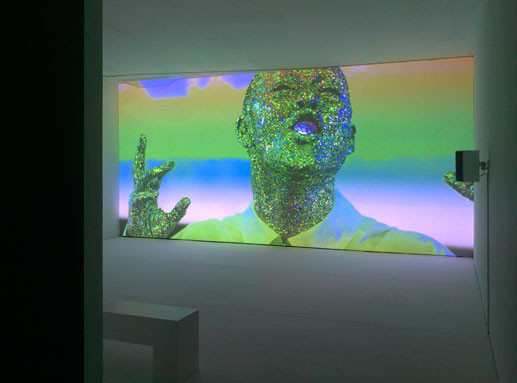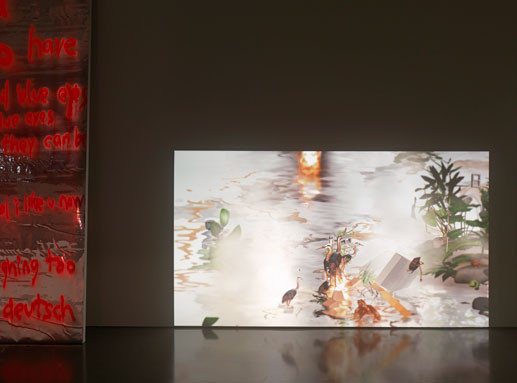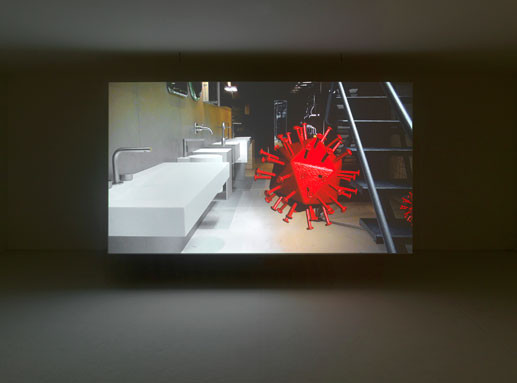Ian Cheng, Wu Tsang, Jordan Wolfson
07 Feb - 19 Apr 2015
IAN CHENG, WU TSANG, JORDAN WOLFSON
Real Humans
7 February – 19 April 2015
Curated by Elodie Evers and Irina Raskin.
The Real Humans exhibition presents works by Ian Cheng, Wu Tsang, and Jordan Wolfson, three young American artists, who each, in their own way, reflect on the conditions of
what it means to be a human being in their multimedia pieces. Each of them takes on a different perspective, examining socio-cultural, biological, economic or psychological structures into which the human being is integrated and which he participates in generating or even changing. Insofar as the artists have a space of their own to present their works, the exhibition
format allows for an “experience space” for singular encounters as well as linkages between the three positions. Real Humans represents Wu Tsang’s and Ian Cheng’s first institutional exhibition in Germany, and both artists have developed new works for this show.
Ian Cheng (b. 1984, USA) first studied cognitive science in California before switching to artistic practice in New York. The development of live simulations—a digital process for the production of potentially infinite and unpredictable animations—is at the heart of his works. Their course is calculated in real time so that image and sound are deformed and transformed live. The animated live simulations represent a possibility to rethink the relationship between humanity and the environment, as well as to playfully make (un-) imaginable evolutions tangible. Questions concerning the relationships between mental structures and behavior, as well as their reciprocal influences are just as present in his works as is the examination of the boundaries of creativity and control, and agency and transformation. Cheng has developed a presentation for Real Humans that places human standards against over-dimensioned arrangements so that as a visitor one finds oneself in a situation that cannot be grasped as a whole. Additionally Cheng has the exhibited pieces enter into a conversation with each other by means of computer software, affecting their form (light conditions, volume, playback
speed) through mutual influencing. This not only modulates the viewer’s perception but also the usual attention economy in exhibitions.
Wu Tsang (b. 1982, USA) is interested in varying forms of identity constructions and related questions with regard to belonging. Tsang examines the gaps between the self and the other in his films and
performances by dealing with biographies of people who, for example, are perceived differently and isolated because of their sexual orientation or ethnic background. His personal involvement in the transgender scene and the immigrant milieu is often the starting point for his artistic work in which he restages the everyday experiences of the protagonists, demonstrating
repressions or describing processes of transformation and recognition. Of central importance is the play with speech acts that generate and codify, but also alter identity. By employing the “full body quotation” method he developed, Tsang creates an alienation effect that marks the tension between the depiction and the depicted. Both the power structures into which Tsang is bound as speaker as well as the impossibility of representing the protagonists in all their complexity are dealt with in his films. Several works, including the award-winning film WILDNESS (2012), are kept in the style of magical realism, which permits the embedding of the wondrous into the story line without introducing it as something irrational or anomalous.
Jordan Wolfson (b. 1980, USA) plays with the myths and meanings of the capitalist pictorial world that influence desire and imagination. Like a disgorged subconscious, the viewer is faced with a current of images and music that can be read as signs for divergent styles and life plans. By creating affectively charged assemblages—heterogeneous accumulations—from diverse pop cultural material, Wolfson makes psychodynamic processes of the affluent capitalist-oriented society tangible in a particularly striking manner. A two-pronged process between self-determination and self-destruction is revealed: In a world full of possible choices, an individual is articulated who is torn between the desire for
belonging and intimacy and the need for isolation and singularity.
In cooperation with the Julia Stoschek Foundation, the performance Moved by the Motion by Wu Tsang and boychild in collaboration with the cellist Patrick Belaga will have its German premiere on the weekend of the exhibition opening. The performance will take place on
February 7, 2015 at 8 p.m. in the Julia Stoschek Collection.
The first monographs on Ian Cheng (in conjunction with the “Kataloge für junge Künstler” advancement prize awarded by the Alfried Krupp von Bohlen und Halbach-Stiftung) and Wu Tsang (in cooperation with the Migros Museum für Gegenwartskunst Zürich) will be published in April 2015 on the occasion of the exhibition.
Real Humans
7 February – 19 April 2015
Curated by Elodie Evers and Irina Raskin.
The Real Humans exhibition presents works by Ian Cheng, Wu Tsang, and Jordan Wolfson, three young American artists, who each, in their own way, reflect on the conditions of
what it means to be a human being in their multimedia pieces. Each of them takes on a different perspective, examining socio-cultural, biological, economic or psychological structures into which the human being is integrated and which he participates in generating or even changing. Insofar as the artists have a space of their own to present their works, the exhibition
format allows for an “experience space” for singular encounters as well as linkages between the three positions. Real Humans represents Wu Tsang’s and Ian Cheng’s first institutional exhibition in Germany, and both artists have developed new works for this show.
Ian Cheng (b. 1984, USA) first studied cognitive science in California before switching to artistic practice in New York. The development of live simulations—a digital process for the production of potentially infinite and unpredictable animations—is at the heart of his works. Their course is calculated in real time so that image and sound are deformed and transformed live. The animated live simulations represent a possibility to rethink the relationship between humanity and the environment, as well as to playfully make (un-) imaginable evolutions tangible. Questions concerning the relationships between mental structures and behavior, as well as their reciprocal influences are just as present in his works as is the examination of the boundaries of creativity and control, and agency and transformation. Cheng has developed a presentation for Real Humans that places human standards against over-dimensioned arrangements so that as a visitor one finds oneself in a situation that cannot be grasped as a whole. Additionally Cheng has the exhibited pieces enter into a conversation with each other by means of computer software, affecting their form (light conditions, volume, playback
speed) through mutual influencing. This not only modulates the viewer’s perception but also the usual attention economy in exhibitions.
Wu Tsang (b. 1982, USA) is interested in varying forms of identity constructions and related questions with regard to belonging. Tsang examines the gaps between the self and the other in his films and
performances by dealing with biographies of people who, for example, are perceived differently and isolated because of their sexual orientation or ethnic background. His personal involvement in the transgender scene and the immigrant milieu is often the starting point for his artistic work in which he restages the everyday experiences of the protagonists, demonstrating
repressions or describing processes of transformation and recognition. Of central importance is the play with speech acts that generate and codify, but also alter identity. By employing the “full body quotation” method he developed, Tsang creates an alienation effect that marks the tension between the depiction and the depicted. Both the power structures into which Tsang is bound as speaker as well as the impossibility of representing the protagonists in all their complexity are dealt with in his films. Several works, including the award-winning film WILDNESS (2012), are kept in the style of magical realism, which permits the embedding of the wondrous into the story line without introducing it as something irrational or anomalous.
Jordan Wolfson (b. 1980, USA) plays with the myths and meanings of the capitalist pictorial world that influence desire and imagination. Like a disgorged subconscious, the viewer is faced with a current of images and music that can be read as signs for divergent styles and life plans. By creating affectively charged assemblages—heterogeneous accumulations—from diverse pop cultural material, Wolfson makes psychodynamic processes of the affluent capitalist-oriented society tangible in a particularly striking manner. A two-pronged process between self-determination and self-destruction is revealed: In a world full of possible choices, an individual is articulated who is torn between the desire for
belonging and intimacy and the need for isolation and singularity.
In cooperation with the Julia Stoschek Foundation, the performance Moved by the Motion by Wu Tsang and boychild in collaboration with the cellist Patrick Belaga will have its German premiere on the weekend of the exhibition opening. The performance will take place on
February 7, 2015 at 8 p.m. in the Julia Stoschek Collection.
The first monographs on Ian Cheng (in conjunction with the “Kataloge für junge Künstler” advancement prize awarded by the Alfried Krupp von Bohlen und Halbach-Stiftung) and Wu Tsang (in cooperation with the Migros Museum für Gegenwartskunst Zürich) will be published in April 2015 on the occasion of the exhibition.



